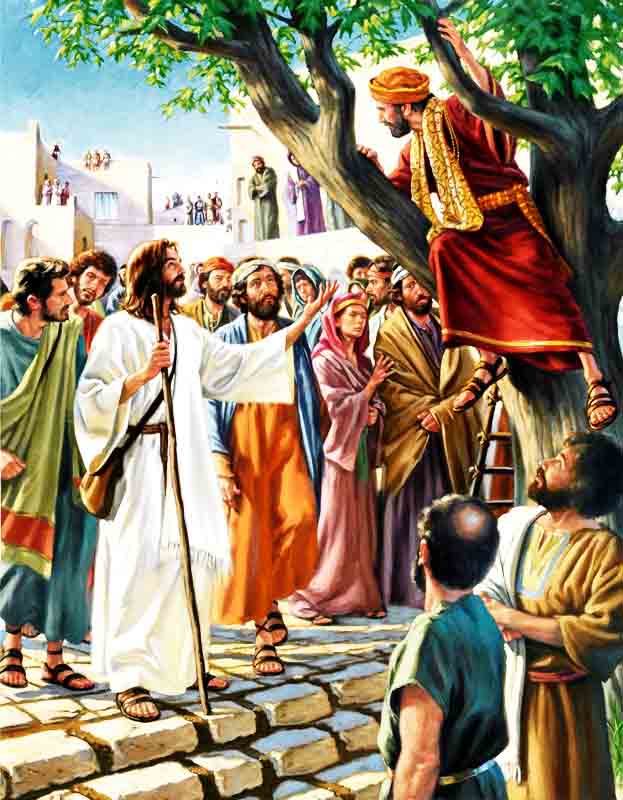By Pr Isaiah White
A real-time event happened in Luke 19:1-10 when Jesus was travelling through Jericho, with multitudes following Him.
He was known by the public for His teachings, healing and miracles.
Among those that followed Jesus was Zacchaeus, the tax collector.
Scripture says this man was short and could not see Jesus due to the towering crowd surrounding Him.
So, he decided to run ahead of the crowd and climb a tree in order to see Jesus. When Jesus saw Zacchaeus up in the tree, he asked him to come down.
He then went with him and they had a meal together in Zacchaeus’ house. This caused Zacchaeus to repent.
The tax collectors
In the New Testament, tax collectors are categorized among sinners (Luke 15:1). Why would people who collect government revenues be considered sinners?
According to Bible scholars, a tax collector in ancient Rome often abused his position.
Tax collectors were contracted by the empire to raise a certain amount of revenue, but to make a profit, they often exploited taxpayers, taking unjust amounts from them so that they could fill their own pockets.
Understandably, people across the empire; Jews and Gentiles alike, detested these officers for their gross abuses.
Additionally, the Jews hated tax collectors because they were official representatives of a repressive and idolatrous state that in their view should not be ruling over them.
If who we are before the public was who we were before God, Heaven would be filled with sinners and Hell with saints in the end.
Zacchaeus was, in public view, such a sinner that a holy man like Jesus should not associate with. But to their shock, Jesus chose to have a meal in his house.
Zacchaeus was impressed by Jesus because no religious leader had ever asked to go to his house.
This gesture influenced his faith in Jesus. The gracious acts of Jesus Christ towards this sinner led him not just to believe, but to repent too.

His presence
The presence of the Lord in the house of Zacchaeus humbled him.
Zacchaeus said: “Look, Lord, I give half of my goods to the poor; and if I have taken anything from anyone by false accusation, I restore fourfold” (Luke 19:8).
The presence of God in our lives trigger us to act in the manner of repentance. All sinners ought to be privileged with the presence of God.
Jesus, while in Zacchaeus’ house, said: “Today, salvation has come in your house for the son of man came to seek and save that which is lost”.
Jesus offered salvation to this sinner and the impact was repentance in action.
Repentance
According to scholars like Bradley Green, “Repentance is a key component of our initial turning from sin to Christ, but is also a necessary part of the ongoing Christian life.
The verb “repent” or “repented” occurs 13 times in the Old Testament. The word “repentance” appears 20 times in the New Testament.
The verb “repent” appears 27 times in the New Testament.
Repentance, therefore, is a Bible theme, and in essence, a practical ‘turning away’.
The Bible tells us what we should ‘turn away from’ in the following verses: transgressions (Ezekiel 18:30), wickedness (Acts 8:22) and of one’s “works” or “deeds” (Revelation 2:21-22).
At times this turning away (repentance) is from idolatry or demon worship (Ezekiel 14:6, Revelation 9:20), or from sexual immorality (Revelation 2:21; 9:20).
Repentance does not stop at telling God: “I am sorry, please forgive me.” True repentance is active.
It is a practical way of living from the point a sinner recognizes their sin and starts walking in a different direction and acting differently.

Repentance in action
While making his repentant statement to Jesus (Luke 19:8), Zacchaeus did not just kneel before God and utter penitent prayers to Him. He acted.
Accused of robbing the public, his repentance in action was through returning whatever he had robbed.
Ezekiel demonstrates what true repentance is in these words: “But if a wicked man turns from all his sins which he has committed, keeps all my statutes, and does what is lawful and right, he shall surely live; he shall not die” (Ezekiel 18:21).
Repentance is not just saying. It is saying and doing.






















